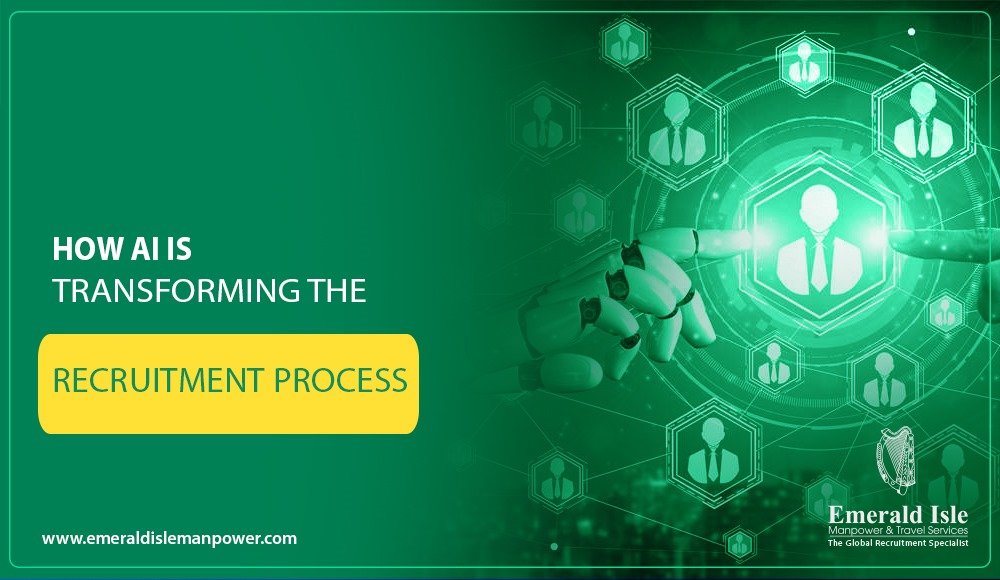What is AI for recruitment?
AI recruiting leverages artificial intelligence to automate time-consuming, repetitive tasks while offering personalization and data insights throughout the hiring process. AI, the science of training machines to perform human-like tasks, allows certain functions to be automated, enhancing efficiency, accuracy, and productivity. In recruitment, AI-powered technology accelerates processes like screening, sourcing, and scheduling, enabling recruiters to focus on more strategic activities. AI is designed to illuminate the path to better hiring decisions, not to replace human recruiters, but to complement their efforts.
Using technologies such as machine learning, natural language processing, predictive analytics, and chatbots, AI in recruitment streamlines and enhances various aspects of the hiring process. This approach aims to make recruitment more efficient, reduce bias, improve the candidate experience, and support data-driven decision-making. By automating repetitive tasks, AI allows recruiters to concentrate on more valuable initiatives, ensuring a more effective and inclusive hiring process.
The Impact of AI on the Recruitment Process
AI is significantly impacting the recruitment process in multiple ways:
Efficiency and Speed
AI tools can automate repetitive tasks such as resume screening, scheduling interviews, and initial candidate outreach. This reduces the time-to-hire and allows recruiters to focus on more strategic activities.
Additionally, AI-driven platforms can quickly process large volumes of applications, ensuring that no potential candidate is overlooked due to human error or time constraints. By streamlining these labor-intensive processes, AI not only accelerates the recruitment cycle but also enhances the overall efficiency of hiring teams, allowing them to engage with top talent more effectively and make faster, more informed decisions.
Improved Candidate Experience
AI-powered chatbots provide instant responses to candidate inquiries, ensuring a more engaging and responsive recruitment process. These chatbots can handle common questions about the company, role, and application status, offering candidates a seamless and interactive experience.
This instant communication helps keep candidates informed and engaged, reducing the frustration often associated with waiting for feedback. Additionally, chatbots can assist in scheduling interviews, providing reminders, and even offering personalized feedback, further enhancing the overall candidate journey and leaving a positive impression of the company.
Bias Reduction
By focusing on objective criteria and anonymizing candidate information, AI can help reduce unconscious bias, promoting diversity and inclusion in hiring. AI algorithms evaluate candidates based on their skills, experience, and qualifications, without considering irrelevant personal attributes such as name, gender, or ethnicity. This ensures that all candidates are assessed fairly and equitably, based solely on their merits and suitability for the role.
Furthermore, AI can continuously learn and improve its algorithms by analyzing recruitment outcomes, helping to identify and mitigate any inadvertent biases that may arise. This ongoing refinement makes the hiring process progressively more impartial and inclusive, contributing to a more diverse workforce. By leveraging AI for unbiased decision-making, companies can build stronger, more innovative teams that reflect a wider range of perspectives and experiences.
Data-Driven Decisions
AI enables recruiters to make more informed decisions by providing insights and analytics based on large volumes of data. By analyzing trends, patterns, and historical data, AI can identify the characteristics of successful hires and predict which candidates are most likely to thrive in a specific role. This data-driven approach allows recruiters to move beyond gut feelings and subjective judgments, making hiring decisions that are backed by concrete evidence.
Additionally, AI can track and measure key performance indicators (KPIs) throughout the recruitment process, such as time-to-hire, cost-per-hire, and candidate satisfaction rates. This comprehensive analysis helps recruiters identify areas for improvement, optimize recruitment strategies, and allocate resources more effectively. By leveraging AI-generated insights, organizations can enhance their overall hiring efficiency and effectiveness, leading to better outcomes for both the company and its employees.
Enhanced Matching and Predictive Analytics
AI algorithms can better match candidates to job openings by analyzing a wider range of factors, including skills, experience, and cultural fit. Predictive analytics help identify candidates who are more likely to succeed in a role. This sophisticated analysis goes beyond keyword matching, taking into account nuanced aspects such as career progression, soft skills, and even personality traits that align with the company culture.
Moreover, AI can continuously update and refine its matching algorithms by incorporating feedback from hiring outcomes and employee performance data. This dynamic adjustment ensures that the matching process remains relevant and accurate over time. As a result, companies can not only find candidates who meet the immediate requirements of a position but also those who are likely to grow and thrive within the organization, leading to higher retention rates and a more cohesive, productive workforce.
How AI is Transforming the Process
AI is transforming the recruitment process through several innovative approaches:
Automated Resume Screening
AI-powered tools can quickly scan and evaluate resumes, identifying the most qualified candidates based on predefined criteria. This reduces the time recruiters spend on manual screening and ensures that no potential candidate is overlooked due to human error or bias.
Chatbots for Candidate Engagement
AI chatbots can handle initial interactions with candidates, answering common questions, and scheduling interviews. This ensures timely responses and keeps candidates engaged throughout the recruitment process.
Predictive Analytics for Hiring Decisions
AI uses predictive analytics to assess a candidate’s potential success in a role. By analyzing past hiring data and performance metrics, AI can help recruiters make more informed decisions.
Enhanced Candidate Matching
AI algorithms can match candidates to job openings more accurately by considering a broader range of factors. These factors include skills, experience, and cultural fit.
Bias Reduction in Hiring
AI can help reduce unconscious bias by focusing on objective data points rather than subjective judgment. This leads to a more diverse and inclusive hiring process.
Video Interview Analysis
AI can analyze video interviews to assess candidate responses, body language, and facial expressions. This provides additional insights into a candidate’s suitability for a role beyond their verbal answers.
Skill Assessment and Testing
AI-driven platforms can administer and evaluate skill tests, providing objective data on a candidate’s abilities. This ensures that candidates possess the necessary skills for the job.
Streamlined Onboarding
AI can personalize the onboarding process by creating tailored training programs and schedules for new hires. This helps new employees acclimate faster and more effectively.
Employee Retention Predictions
AI can analyze data to predict which employees are at risk of leaving. This enables HR to take proactive measures to improve retention.
Continuous Improvement
AI systems learn and improve over time, becoming more accurate and efficient as they process more data. This continuous improvement helps companies stay ahead in the competitive talent market.
Conclusion
AI is fundamentally changing the recruitment landscape by automating routine tasks, enhancing decision-making, and improving the candidate experience. As AI technology continues to evolve, its role in recruitment is likely to expand, offering even more innovative solutions to help companies attract and retain top talent. Embracing AI in recruitment not only streamlines the process but also promotes a more data-driven, objective, and inclusive approach to hiring.








